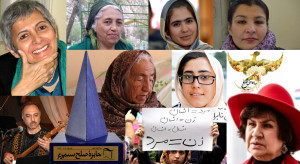The statutes of 4th Simorgh International Peace Prize were awarded on Human Rights Day (10th December 2015) in the context of the Human Rights Week and simultaneously with the 19th anniversary of Armanshahr’s establishment.
This time round, women who are true protectors of peace in three countries located at the heart of Asia – Afghanistan, Iran and Tajikistan – were recipients of the awards; women who despise war-mongering and stand up to it by their civic and sustained initiatives; innovative women who resist the despotic and war-afflicted world and give us hope to continue the struggle to change the unjust relations and serve equality.
Before awarding the statutes, Rooholamin Amini, Deputy Director of Armanshahr, said: “Today, we praise women who are the voice of humanity. Let’s hope we will be able to speak of less pain in the coming years and deal with more achievements than today.”
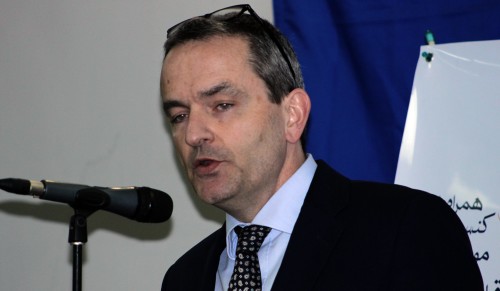
Subsequently, the Swiss Ambassador to Pakistan and Afghanistan Marc George opened the ceremony with a brief speech. Referring to the widespread assistance and consultation regarding Afghanistan, he said: There is cooperation and solidarity in this regard within the international community. You are not alone and the international community is with you. Unfortunately, there are negative attitudes toward women in western countries too, especially in Switzerland. Studies there show that children hold aggressive views towards girls.
Then, names of recipients of the 4th Simorgh International Peace Prize were announced.
The following were the prize recipients from Afghanistan: Horia Mosadiq, in appreciation of more than two decades of human rights activities on the national and international levels; Auntie Sakina, in appreciation of a life-time of bravery and courage in breaking sexual taboos; Maryam Durani, for her resistance and initiatives to make voices of women heard from Kandahar; Farkhonda Rajabi, an outstanding example of young girls who employ culture and knowledge to promote enlightenment.
The awardee from Iran was Mehrangiz Kar, for a life-time of defending freedom, and equal rights for women and the awardees from Tajikistan were Golrokhsar Safieva, in praise of a powerful and knowledgeable poet and writer, the heart of whose poems and writings beats with the social, political and cultural developments in her country and the region; and Mehrenegar Bahranova, in appreciation of a life-time of social work for women and children.
Armanshahr also praised Waheed Kaacemy (Afghanistan) for his efforts to bring message of peace and friendship through music and research, and the Civic Campaigns of Iranian Women for being a unique example in Iran and the region, striving for equality, justice, freedom, and elimination of discrimination.
Three of the awardees were present at the ceremony.
Upon receiving the Simorgh statute, Horia Mosadiq said: “Our activities are not intended for rewards and praise, but when we receive appreciation, we receive energy too. We have opponents who do not like our activities and try to prevent us by various means. This appreciation, however, gives me the impression that there are fellow travellers who value my activities and this is an honour for me.”
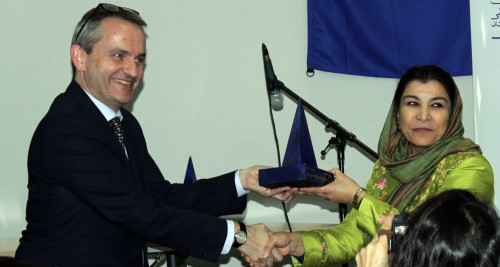
Horia Mosadiq, human rights activist and journalist, an intellectual from Afghanistan who has spent 22 years of her life on media activities, human rights, women’s rights and transitional justice, has been working as Afghanistan researcher for Amnesty International since September 2008.
Farkhonda Rajabi, the other awardee, said upon receiving the statute: “In my opinion, the true protectors of peace are the girls who still go to school although they are shivering from fear and despite heavy security threats, and try to enter the university. I am pleased that I have been selected to receive the Simorgh Peace Prize. I know that this prize shall motivate me to take stronger steps for peace.”
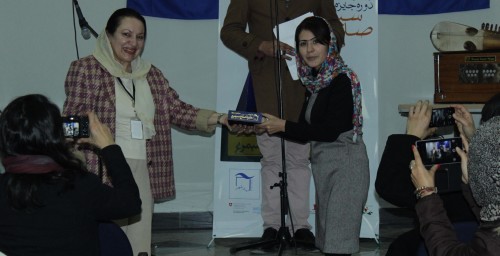
Rajabi is a journalist born in Mazar-e-Sharif in 1990. She went to school under the new regime and published the first student newsletter in the framework of the Ministry of Education of Balkh province when she was studying in the ninth grade. The newsletter formed the backbone for the “Parto” monthly and cultural house, an institution that trained many cultural activists. In his “History of Literature in Balkh,” Saleh Mohammad Khaliq described the Cultural House as a source of a new wave of female poets, writers and cultural activists. She is a co-founder and member of Board of Directors of “Civil Activists for a Sustainable Development,” which she set up with four “like-minded” colleagues in 2011. They have organised numerous national and international programmes in collaboration with Finland and Germany among others.
Auntie Sakina was also present at the ceremony and upon receiving the Simorgh statute said: “This prize is an honour for me and I am glad that there are young people who are endeavouring to raise the consciousness of the people.”
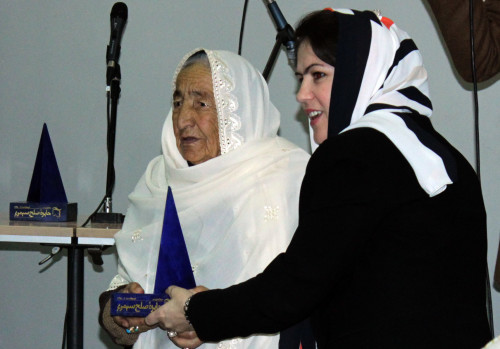
The International Simorgh Peace Prize had been awarded to poets and writers, independent publishers, and musicians in the previous three rounds.

